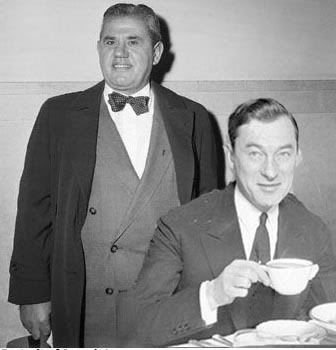
Two of the many interesting characters he's met, Socks Lanza and Mayor Jimmy Walker

A letter I received from Dr. White after I forwarded Princeton's Institute of Advanced Studies a chapter of Cliff's KV notes
Dear Mr. Bellel:
Thank you very much for that fascinating story and for that picture of my father’s (and earlier my grandfather’s) shoe store. The building, by the way, was one in which my father, my mother and I lived for many years. My recollection is that we began to live there in 1923—when I was six years old—until I left home in 1938, but I don’t remember how long my parents lived there before moving to Knickerbocker Village. They both died in 1969.
You may know that my father moved his store to Knickerbocker Village but I don’t remember in what year; you may also know that he was a member of the New York City Council while representing that part of Manhattan—during what years I no longer know.
Perhaps you are familiar with my memoir, A PHILOSOPHER’S STORY, published in 1999; if not, you will find in it some reminiscences of mine about life in that neighborhood before KV was built.
Again, many thanks for sending me that piece.
Sincerely, Morton White
A review of Philosopher's Story
Although a great many memoirs are being published these days, this autobiography by Morton White has special significance because professional philosophers seldom write their memoirs and, when they do, they rarely produce books as engaging as this one. As historian of ideas and a philosopher, White is able to situate his life in the deeper and broader intellectual currents of his time, and therefore the story of his experiences at Columbia, Harvard, and the Institute for Advanced Study is a brilliantly conceived contribution to the history of American philosophy in the twentieth century. Readers concerned with the development of higher education will be fascinated by White's description of the struggles over religion at Harvard in the 1950s, while historians of urban life will be much interested in his vivid account of his boyhood on the Lower East Side of New York. And students of pragmatism will learn much about the twentieth-century attack on the distinction between analytic and synthetic statements from a letter written to White by the Polish logician Alfred Tarski, and from the three-way correspondence of Nelson Goodman, W. V. Quine, and White reproduced in an appendix. The author's discussion of his contact with such influential thinkers as John Dewey, G. E. Moore, and Isaiah Berlin, and especially his extensive correspondence with Berlin, will further enhance the book's appeal to a broad audience. Indeed, White's autobiography should attract more attention among the educated public than any book written by an American philosopher in many years.--Peter H. Hare, SUNY Distinguished Service Professor of Philosophy and Editor, Transactions of the C. S. Peirce Society: A Quarterly Journal in American Philosophy.


























No comments:
Post a Comment